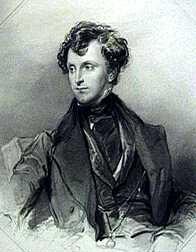James Emerson Tennent
|
Sir James Emerson Tennent Bt FRS |
|
|---|---|

James Tennent drawing by Andrew Nicholl
|
|
| 5th Colonial Secretary of Ceylon | |
|
In office 1846–1850 |
|
| Monarch | Queen Victoria |
| Preceded by | Philip Anstruther |
| Succeeded by | Charles Justin MacCarthy |
| Acting Governor of British Ceylon | |
|
In office 19 April 1847 – 29 May 1847 |
|
| Monarch | Queen Victoria |
| Preceded by | Colin Campbell |
| Succeeded by | The Viscount Torrington |
| Personal details | |
| Born |
James Emerson 7 April 1804 Belfast, United Kingdom |
| Died | 6 March 1869 (aged 64) London, United Kingdom |
| Citizenship | United Kingdom |
| Nationality | British |
| Political party |
Whigs (until 1832) Conservatives (1832-1869) |
| Spouse(s) | Letitia Tennent |
| Children | 3 |
| Alma mater | Trinity College, Dublin |
| Occupation | Colonial administrator, Politician |
| Profession | Lawyer |
Sir James Emerson Tennent, 1st Baronet FRS (7 April 1804 – 6 March 1869), born James Emerson, was a British politician and traveller born in Ireland. He was elected a Fellow of the Royal Society on 5 June 1862.
The third son of William Emerson, a merchant of Belfast and Sarah daughter of William Arbuthnot of Rockville (or Rockvale), Co Down, he was born there in 1804. He was educated at the Belfast Academy and Trinity College, Dublin, of which he afterwards became LL.D. He took up the cause of Greek independence, and travelled in Greece, publishing a Picture of Greece (1826), Letters from the Aegean (1829), and a History of Modern Greece (1830); and he was called to the English bar at Lincoln's Inn in 1831. In this year he married Letitia, daughter and co-heiress (with her cousin, Robert James Tennent, M.P. for Belfast, 1848–52) of William Tennent, a wealthy merchant at Belfast, who died of cholera in 1832, and he adopted by royal licence the name of his wife in addition to his own.
He entered parliament in 1832 as member for Belfast. In 1841 he became Secretary to the Board of Control, and in 1843 he was presented with a service of plate by the calico printers of Great Britain as an acknowledgment of his getting a bill passed in Parliament for the copyright of calico designs. He was a friend of both Charles Dickens and Dickens's biographer John Forster, and was the dedicatee of Dickens's last completed novel Our Mutual Friend (1865).
In 1845 he was knighted and appointed colonial secretary of Ceylon, where he remained till 1850. While he was there, an economic depression in the United Kingdom severely affected the local coffee and cinnamon industry. Planters and merchants clamoured for a reduction of export duties. Tennent therefore recommended to Earl Grey, Secretary of State for Colonies in London that taxation should be radically shifted from indirect taxation to direct taxation, which proposal was accepted. It was decided to abolish the export duties on coffee and reduce the export duty on cinnamon leaving a deficit of £40,000 Sterling which was to be met by direct taxes on the people. This was one of the causes of the Matale Rebellion of 1848.
...
Wikipedia
